- Home
- T. A. Pratt
Poison Sleep Page 4
Poison Sleep Read online
Page 4
Marla shook her head. “No, you’ve got him all wrong. Hamil…no. It’s not like that. He’s organized the street kids of this city into a small army. He keeps them fed, makes sure they stay healthy, and when they get old enough, he helps get them off the street. It’s not about sex. I’m not saying his motives are totally pure, but they’re motivated by healthy self-interest, not any perverted shit. Nobody pays much attention to street kids. Nobody thinks they notice much, or that they care if they do see things. The kids get everywhere, and they’re nosy. They’re perfect spies. That’s why Hamil stays so fat—because he’s got so many mouths to feed.”
Joshua frowned. “I don’t understand. What does his weight have to do with it?”
“Sympathetic magic, Joshua. Hamil keeps himself fat, and his kids never go hungry. They’re all connected to him. It’s like…you’ve heard of the Fisher King? A king connected to the land? If he’s sick, the crops fail, and if he’s healthy, everything thrives? Hamil’s like that, on a small scale. He’s sated, and so are his kids. Plus, fat is an indication of wealth, magically speaking, and by appearing prosperous, Hamil stays prosperous.”
“There are many fat people who are not prosperous,” Joshua said. “It is an American epidemic.”
Marla shrugged. “Those people aren’t sorcerers, Joshua. Hamil is. And he’s not a pedophile. Sorcerers can be morally flexible, but I’ve got a few limits, things I won’t do and won’t let my people do, even if they can be magically potent. Any kind of rape. Permanent mental domination. Nonconsensual human sacrifice. Things like that.”
Joshua’s eyes widened. “But…consensual human sacrifice?”
“It’s not my thing—I think it’s sad and creepy—but I can’t think of a good reason why people shouldn’t be able to end their lives if they want to, and if they choose to do it in some magical ritual, hell, whatever. I’d rather they donate their organs to medicine, but it’s not my place to say.”
“I see,” Joshua said. “Yes. I think this could all be very interesting.”
“Great,” Marla said. She wanted to take him in her arms and welcome him into her family. “Come to the nightclub, tonight, midnight. Hamil will give you directions. I’ve got a little meeting you could help me with. Nothing major, so it won’t be the end of the world if you fuck it up, but if you do okay, we’ll see about keeping you around.”
“A test of my abilities?” He looked amused.
“I don’t doubt your abilities. I do doubt your punctuality, your seriousness, your commitment, your loyalty, your willingness to follow orders, and your general stick-to-it-iveness. That’s what I want to test.”
“Fair enough.” He rose and extended his hand. Marla hesitated. Could she take his hand without dropping to her knees and sucking his fingers? Fuck yes, she could. She’d once kicked a hound from the underworld across a room. She’d killed Somerset, one of the most infamous sorcerers of all time. She’d apprehended the Belly Killer, and outsmarted both Roger Vaughs. She could control herself around a pretty boy.
Marla shook his hand, firmly. “Remember, midnight. And don’t be late, or the deal’s off the table. You’re not the only beautiful boy in the world.” She came around the desk and left the room without giving him another glance.
Hamil sat reading in his chair, and looked up when she emerged. “That was quick,” he said. “Did you charm him?”
“He’s in. Tell him how to get to the club. And do you have a coat I can borrow?”
4
M arla walked briskly through the streets, away from Hamil’s apartment, clear sky making a sunlit dazzle of the snow, though the brightness didn’t lessen the cold. She was deep in her head, far more so than usual, all because of that boy. Even knowing Joshua’s loveliness was supernatural, that her attraction to him was a brain-hijack based on pheromones or psychic invasion or something, didn’t change her feelings. She wanted to eat him with a dessert spoon. How was she supposed to work with him? Maybe she’d make Hamil give him all his instructions. Her consiglieri was the most heterosexual person she knew, so he probably saw Joshua as a long-lost son or something, and wouldn’t lose his head around him the way Marla feared she might.
She walked past a thin man huddled on a grate, paused, and turned back to him. “Hey,” she said. “You’re sitting on Dutch Mulligan’s grate.”
The man looked up at her, squinting. He wasn’t very old—mid-forties, maybe, and the wings of white in his brown hair at the temples made him seem distinguished. He didn’t have a coat, and even in the heat of the grate, he shivered. “What?” he said. “I’m sorry?”
Marla crouched before him. “You’re sitting on Dutch Mulligan’s grate. He’s probably out buying a bottle or something, but he’ll be back here, and if he finds you on his grate…well, Dutch will fuck you up.” She shrugged. “Maybe you’re looking to get fucked up, I don’t know, but if not, you’d better move along.”
The man struggled to his feet. “I didn’t realize I was…trespassing. Thank you.” He was trying for dignity, and almost achieving it, despite his stained pants and the sweet reek of his body odor.
“How long have you been on the streets?” Marla asked, rising.
“A few weeks. It wasn’t so bad, until the weather turned.”
Marla nodded. The winter had been almost mild until a few days ago, when a blizzard came pounding down on them. February was the worst. The city was still digging itself out. “What’s your name?”
“Ted.” He extended his hand in an automatic gesture that he clearly regretted. He started to pull back his hand, but Marla gripped it and gave it a shake.
“You’ve got a good handshake, Ted. Tell me something. What kind of drugs are you on?”
“None. Do I look like I’m on drugs?” He didn’t. He looked offended.
She shrugged. “If you’re not, you really haven’t been on the streets for long. Would you describe yourself as a detail-oriented person, Ted?”
“I…why do you ask? Who are you?”
“I’m the person interviewing you for a job. I’m looking for a personal assistant. You’re my first applicant.”
“Please leave me alone,” he said, sad and resigned. “You’re mocking me.”
“Ted. I’m really not. Listen, I’m a busy woman, but if you don’t want the job, I’ll find someone who does.”
“Nobody hires a…a street person.”
Marla snorted. “I’m not asking you to be a brain surgeon. I need somebody to fetch coffee, file things, take phone calls, and make sure I don’t forget anything important. Do you want the gig or don’t you? If it turns out you are drunk or stupid or strung out or something, I’ll fire you, of course.”
“Ah…I’m not interested in being an indentured servant. What does it pay?”
“It pays more than you’re making out here on Dutch Mulligan’s grate. You can discuss the details with my human resources representative. Look, here’s a card and some cab fare. The address is a nightclub called Juliana’s. Go over there and knock on the door. My associate Rondeau owns the place, and when he answers, tell him I sent you, and that you’re my new personal assistant. He’ll get you set up. But if he tries to make you unclog his toilet, don’t do it. You work for me, not him. You can tell him I said that, too.”
“All right,” Ted said, taking the card and frowning. “Will you be there?”
“Yeah, pretty soon. We’ll talk more then. I’m Marla Mason. You can call me Marla.” Poor guy probably thought she was planning to drug him and steal his organs or something. Well, who could blame him? People weren’t trained to expect good things to drop on them from out of nowhere. But Marla had a lot of bad karma to burn off, and the occasional spontaneous outbreak of kindness was called for. Besides, Ted couldn’t be any worse than the people Rondeau would line up for her to interview. “See you later,” she said, and set off. She went the long way around Fludd Park, having no desire to walk on paths through bare trees, past a frozen duck pond, in nature. She’d seen enough na
ture this morning from the passenger seat of her Bentley. She should call Rondeau, tell him to expect Ted—
Her vision blurred, her head pounded, dizziness overwhelmed her—and the city changed.
She stepped down two inches, hard enough to make her teeth click together. The sidewalk beneath her feet had vanished. Instead of icy concrete, she stood swaying on broad cobblestones in the center of a wide avenue that curved away in both directions. The air smelled of orange blossoms, like Cordoba in spring. The buildings around her were no longer constructed of brick and stone, but of fluttering canvas with doors and windows painted on, like theater backdrops. A gust of wind blew through the street, and the sides of the buildings bulged like sails as air slipped into the cracks near the ground. Her vertigo faded as quickly as it had come. She wished for her cloak, or her dagger of office, something to make her more dangerous than endangered.
Her impeccable sense of direction was gone, and she couldn’t remember when she’d been more disoriented. She knew her city, and this wasn’t it. Had she been teleported somewhere? But, no, that wasn’t possible, being teleported was a far more traumatic experience than this, and she didn’t sense any breaks in her consciousness. She was just…someplace else. Marla turned and turned about, checking her sight lines, looking for threats, and breathing slowly to calm the spike of adrenaline that caused her heart to hammer. No snow fell, and the warm, humid air already made her want to shrug out of her borrowed coat.
Never one to wait when movement was an option, Marla hurried along the cobblestones, past the buildings, which sighed and billowed. The road curved and then dead-ended at a grassy square surrounded by leafy trees with branches full of bright yellow fruit. A woman sat on a stone bench in the center of the square.
Approach, or observe? Before Marla could choose a course, the woman turned around and beckoned her. She had caramel-colored flyaway hair, and she wore pale yellow, except for a black scarf draped around her neck. She looked familiar, but vague, like the memory of a dream.
“What’s your name?” the woman asked once Marla came within hailing distance.
Marla ignored her, looking into the treetops and making sure no one waited to ambush her.
“I’m Genevieve. Are you lost?”
Genevieve? Shit. This was Husch’s fugitive, and this…place…was hers, somehow. A little scooped-out pocket in the universe, a pinched-off piece of Dreamtime, a hallucination made real…or else, Genevieve was a reweaver, and she’d transformed Felport into this place of cobbles and oranges.
“I guess I am lost,” Marla said, looking Genevieve up and down. Late twenties, early thirties, probably a bit younger than Marla herself—except, of course, she had to be older—with a pleasant smile and startling violet eyes. Not exactly pretty, except for the eyes.
“You’ll be safe here,” Genevieve said. She patted the bench beside her.
Marla remained standing. “I didn’t realize I was in danger.”
The woman cocked her head as though listening to something far away, and for a moment Marla thought she heard the distant strains of some pop song on a tinny radio, but then the wind snatched it away. “He’s passing by now, but you should probably wait a while.”
“Who’s passing by?”
“He…he’s dangerous,” she said. “He’ll hurt you. He likes that. Hurting women. You aren’t safe. I don’t mind giving you refuge. I owe you, after all; without you, I—” She broke off abruptly, touching her forehead in a chillingly familiar gesture. Marla’s mother had suffered from migraines, and she had touched her own forehead that way just before the bad ones started. “You helped me?” the woman said, more a question than a statement, more to herself than to Marla.
“I don’t think so,” Marla said, but then a memory rose up, the sort of drifting blurry remembrance she associated with dreams. “Did I see you lying in the snow, just a little while ago?”
“It never snows around me,” she said, still rubbing her forehead. “I don’t like snow. Bad things happen in the snow.”
“Bad things happen everywhere.” Marla took off her coat and hung it over her arm. The heat here, gods! Like being back in Indiana at the height of humid summer, what her mother had called three-shower weather, because you needed to take at least that many showers a day just to feel clean.
“You should go now, before I have a nightmare,” Genevieve said. “The danger’s past, you’ll live to see nightfall. You have to live, to help me, or…I’m not sure…it’s uncertain….” She shook her head. “This is going to be a bad one,” she said apologetically.
The wind picked up, howling through the square, and this time it came cold, chilling the perspiration on her skin. Marla started to put her coat back on, but the wind tore it from her grasp and sent it flying into a tree. Genevieve held her hands up, as if to ward off something, her hair blowing across her face and hiding her features. Marla’s own hair, cropped short, gave her no such problems. She squinted into the wind, until all the leaves were torn from the fruit trees, whirling through the square, striking Marla in the face. She crouched, sitting on her heels and covering her face with her hands, until the leaves had all blown away. When she looked again, the canvas-covered buildings were rippling. Long tears appeared in the painted fabric, swelling slits that revealed blackness. The canvas shredded into tatters, streamers blowing out to reveal the frameworks underneath. These weren’t buildings at all, just skeletal constructions….
Literally skeletal, Marla saw, and that chilled her more than anything else she’d seen in this place. Instead of steel girders or wooden beams, the buildings were made of bones, like macabre box kites. With the canvas torn aside, the white length of gigantic femurs and spines were exposed underneath, with bits of flesh clinging to the knobby ends. These buildings were built from the bones of giants and leviathans.
Except they aren’t built from anything. They’re just manifestations of a poor sick woman’s mind. Marla shouted, though her words were torn away by the violence in the air, “Genevieve! I can help you! Come with me, I’ll take you somewhere safe, back to your room—”
Genevieve wailed into the still-rising wind.
Marla looked beyond the square and saw a black tower in the center of the street, which had been empty before. The spire’s height disappeared into the heavens, and it cast a long shadow—a shadow that seemed to have as much substance as the building itself.
Someone emerged from the shadow. He wore a long, shiny black coat that flared from the waist—the sort of coat goth posers might like—and it whipped around him as he approached. His bald head looked mushroom-soft and white, but at this distance Marla couldn’t make out his features. She stepped into the wind, the air itself pushing hard against her, and shouted, “Hey, you! Piss off!”
When the man was about fifteen feet away, a pair of long knives slid from his sleeves, hilts dropping neatly into his hands. He didn’t change his pace, and his close-set, narrow black eyes looked beyond Marla, focused on Genevieve. The canvas tatters blowing on the bone frames made her think of banners flying over medieval castles, or battle-flags on grisly standards. Marla set her legs shoulder-length apart, taking a defensive stance. Fighting weaponless against a man armed with knives could be tricky, especially with the wind trying to push her over, but Marla wasn’t going to stand by and watch Genevieve get carved up—maybe it was a knee-jerk reaction, but she tended to favor unarmed women over knife-wielding trench-coated thugs who dressed like they’d seen too many action movies.
Several long strips of canvas tore loose from the buildings and whirled toward her. One struck her in the face, stinging her eyes and driving her back a step. Blind and in danger of suffocation, she tore at the fabric.
As she pulled the canvas away from her face, the wind died. Marla stood holding the shred of rough fabric, then almost tumbled forward as the earth tilted beneath her.
Everything changed again. No square, no skeleton buildings, no leafless trees, certainly no black-clad mushroom men or wai
ling psychic fugitives. She was back in her own icy city, standing next to a monolithic bank on a deserted street. But she still had the bit of fabric, heavy and painted to look like red brick, in her hand. She’d lost her coat, too, and she shivered.
Marla dropped the fabric to the sidewalk and took deep breaths. She reoriented herself and realized she was not far from Rondeau’s club. Two dozen blocks away from the place where she’d first shifted into the orange-scented nightmare, a distance she’d somehow traveled without crossing the intervening space.
Or maybe in that other place, the distances were shorter. When things got hyperspatial, Marla sometimes became disoriented. She didn’t like folded space, and found scallops in the fabric of reality unnerving. All that space had to come from somewhere. There were consequences to screwing around with reality so blatantly. That’s why reweavers were so dangerous. They were like genies with limitless wishes, but every wish had unforeseen consequences. The ripples could take years to show themselves, like earthquake compression waves that started out small but had the potential to become enormous and destructive over time and distance.
She hurried on to the club, her mind already spinning through contingencies. She had to put a lid on this Genevieve situation. It was more dire than she’d realized. Having a crazy psychic on the loose was not an acceptable situation, especially when Marla had to meet with the assembled sorcerers of Felport in a few days. She’d call Langford, and they’d track down the poor lady. Maybe get him to scry for Zealand while he was at it. And if Langford’s arts couldn’t cut it, she’d grit her teeth and ask Gregor for help. Nobody was better than him when it came to nailing down the flapping gauze of future possibilities and identifying the clearest likelihoods—and if that talent made him into an arrogant bastard who always acted like he knew more than anybody else, well, that didn’t mean Marla couldn’t use him. He did owe his fealty to her, whether he liked it or not—she ran Felport, and if he didn’t like dealing with her, he was welcome to leave town, or try to overthrow her. The latter wasn’t likely. Gregor was a seer, not a fighter. He’d gotten very rich off divination—futures trading was a snap when you could predict the future, even somewhat imperfectly—and most of the heavy hitters in town owed him favors because of information he’d provided over the years. Gregor was a lurker in shadows, basically Marla’s polar opposite. They couldn’t stand each other, but she’d use him if he was the right tool for the job.

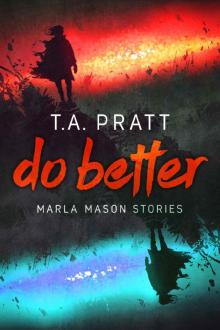 Do Better: Marla Mason Stories
Do Better: Marla Mason Stories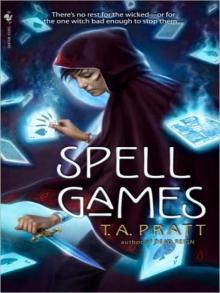 Spell Games
Spell Games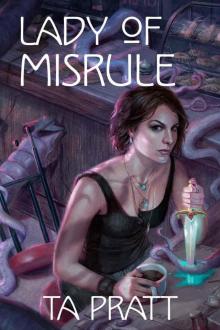 Lady of Misrule (Marla Mason Book 8)
Lady of Misrule (Marla Mason Book 8)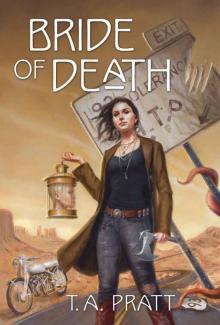 Bride of Death (Marla Mason)
Bride of Death (Marla Mason) Dead Reign
Dead Reign Blood Engines
Blood Engines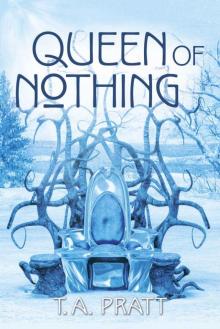 Queen of Nothing (Marla Mason Book 9)
Queen of Nothing (Marla Mason Book 9)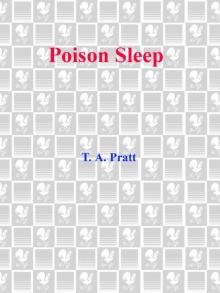 Poison Sleep
Poison Sleep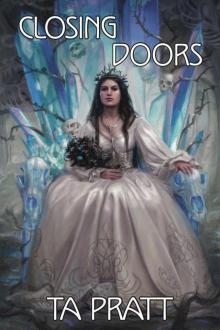 Closing Doors: The Last Marla Mason Novel
Closing Doors: The Last Marla Mason Novel